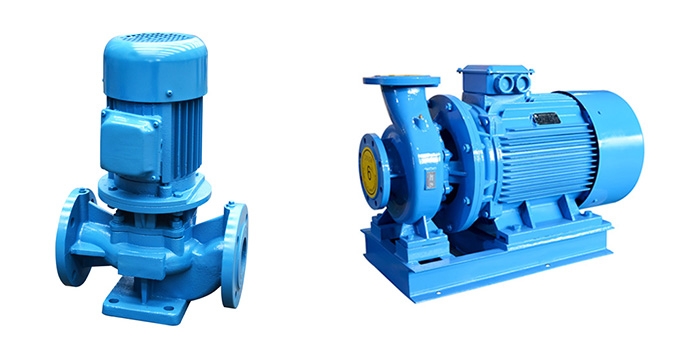Centrifugal pumps, a common type of fluid machinery, are widely used in both industrial and civil fields due to their simple structure, smooth operation, and high efficiency. As modern technology continues to evolve, the applications of centrifugal pumps have expanded across various industries, making them an indispensable component in fluid transfer systems. This article will explore the basic principles of centrifugal pumps, their specific uses across different industries, and how they contribute to improved productivity.
How Does a Centrifugal Pump Work?
First, Inverter.com will briefly explain how centrifugal pumps work. Centrifugal pumps operate based on the centrifugal force generated by the rotation of an impeller. This force drives the fluid from a lower point into the pump, where it is accelerated and expelled outward through the impeller, increasing the fluid's kinetic energy and pressure. The process can be broken down into three main steps:
1. Suction Process: Fluid is drawn into the center of the impeller through the suction pipe.
2. Acceleration Process: As the impeller rotates at high speed, the fluid is thrown outward from the impeller center due to centrifugal force.
3. Discharge Process: The fluid flows through the volute or diffuser passages, where its kinetic energy is converted into pressure energy, enabling its discharge.
This centrifugal action makes the pump effective in transporting fluids, especially for high-volume, low-viscosity liquids over long distances.

Applications of Centrifugal Pumps in Industrial Fields
- Oil and Gas Industry: Centrifugal pumps play a crucial role in oil and gas extraction and transportation. In oil fields, these pumps are used to increase the pressure of crude oil and natural gas, allowing them to be transported from deep underground to the surface. These pumps operate reliably in high-temperature and high-pressure environments, meeting the complex demands of oil extraction. In refineries, centrifugal pumps are essential for transferring various liquid petroleum products, such as crude oil, diesel, and lubricants. They are also used in high-temperature and high-pressure processes, ensuring efficient production workflows.
- Chemical Industry: The chemical industry involves the transport and handling of a wide range of liquid chemicals. Centrifugal pumps are commonly used to transfer highly corrosive chemicals, such as acids and alkalis. These pumps must have excellent corrosion resistance and tight seals, often made from materials like stainless steel or titanium alloys to handle harsh environments. Additionally, centrifugal pumps are widely used in cooling, heating, and evaporation processes within chemical reactions, helping to maintain process stability and improve product quality.
- Water Treatment Industry: In sewage treatment plants and water purification facilities, centrifugal pumps are used for the transport of wastewater, sewage, and clean water. Sewage pumps need to handle media containing solid particles and impurities, often requiring specially designed centrifugal pumps like non-clogging pumps. Water purification plants use centrifugal pumps for raw water extraction and the transport of treated water. High-flow pumps ensure a stable supply of clean water to the community.
- Power Industry: In power plants, including thermal and nuclear facilities, centrifugal pumps are vital for boiler feedwater, cooling water circulation, and other key processes. The performance of these pumps is critical as they must withstand high temperatures and pressures to ensure the continuous and safe operation of the power generation equipment. In nuclear power plants, the reactor cooling system relies on centrifugal pumps. Their operational stability and reliability are directly linked to the overall safety of the plant.
- Food and Beverage Industry: Centrifugal pumps are commonly used in the food and beverage industry for the transport of liquids such as milk, juice, and beer. Since hygiene is paramount, pumps used in this industry are typically made from food-grade materials and designed for easy cleaning and sterilization. These pumps are also employed in product cooling and heating processes, such as in the pasteurization of dairy products.
Applications of Centrifugal Pumps in Civil Fields
1. Water Supply and Drainage: Centrifugal pumps are widely used in municipal water supply systems. They can extract water from underground sources or surface water and use pressure to transport it to high-rise buildings or distant locations, ensuring a sufficient water supply for residents. In drainage systems, centrifugal pumps help to remove rainwater and wastewater from low-lying areas, preventing flooding and mitigating environmental and safety hazards.
2. Agricultural Irrigation: In agriculture, centrifugal pumps are essential for irrigation. These pumps can extract water from rivers, lakes, or groundwater sources and transport it to fields that require irrigation. The steady flow of water provided by centrifugal pumps ensures efficient coverage of large agricultural areas, reducing labor requirements and significantly improving agricultural productivity. Centrifugal pumps are also used in livestock watering systems, supplying a steady water source to large farms.
3. Construction and Firefighting: During construction, centrifugal pumps are used for dewatering, water supply, and other essential tasks related to infrastructure development. For instance, in underground engineering, tunnel construction, and deep excavation, centrifugal pumps are crucial for efficient water extraction, ensuring smooth project progress. In firefighting systems, centrifugal pumps supply firefighting water, especially in high-rise buildings. These pumps ensure high-pressure water delivery, facilitating the timely and effective extinguishing of fires. The 3-phase 5 HP centrifugal pump for sale at Inverter Online Shop can be used for industrial and municipal water supply, such as production line pipeline pressurization, fire water, and air conditioning system water supply.
Special Applications of Centrifugal Pumps
- Marine and Offshore Engineering: Centrifugal pumps have a wide range of applications in ships and offshore platforms, primarily for seawater transfer, ballast water discharge, and cooling water circulation. Given the corrosive nature of seawater, pumps used in marine environments must be constructed from materials with excellent corrosion resistance.
- Mine Dewatering: In mining operations, groundwater often poses a challenge, and centrifugal pumps are used to efficiently extract water from the mine to avoid flooding. Pumps used in mining environments must have high abrasion resistance to handle water-containing particles.
- Pharmaceutical Industry: In pharmaceutical manufacturing, centrifugal pumps transfer and separate liquid pharmaceuticals. For example, during large-scale drug production, these pumps ensure precise liquid transfer, maintaining the continuous and efficient operation of the production line. Centrifugal pumps in this industry must adhere to strict hygiene and safety standards.

Development Trends in Centrifugal Pump Technology
- Energy Efficiency and Environmental Protection: As the focus on energy conservation and environmental protection intensifies, centrifugal pump technology continues to advance. More efficient energy-saving centrifugal pumps are being adopted across industries. By optimizing pump body structures and improving impeller designs, the energy efficiency of centrifugal pumps has significantly increased, reducing energy consumption and operational costs.
- Intelligent and Automated Control: With increasing demands for automation in modern industries, centrifugal pumps are evolving toward intelligent control. For instance, smart centrifugal pumps equipped with sensors and control systems can monitor operational conditions in real-time and automatically adjust parameters to ensure optimal performance, improve work efficiency, and extend equipment life.
- Corrosion and Wear-Resistant Materials: To meet the demands of specific industries, the materials used in centrifugal pumps are continuously improving. Pumps made from corrosion-resistant and wear-resistant alloys or composite materials are being developed to cope with harsher working conditions. These advancements have significantly improved the service life and reliability of centrifugal pumps used in sectors like marine, mining, and chemical processing.
Centrifugal pumps, as highly efficient fluid transfer devices, have become widely utilized across industrial, agricultural, and civil fields due to their simple structure and robust functionality. Looking to the future, with the continued development of energy-saving and intelligent technologies, the application scope of centrifugal pumps will expand further, and their technical standards will improve. Whether in daily life or complex industrial environments, centrifugal pumps will continue to play an essential role, in driving progress and development across various industries.
